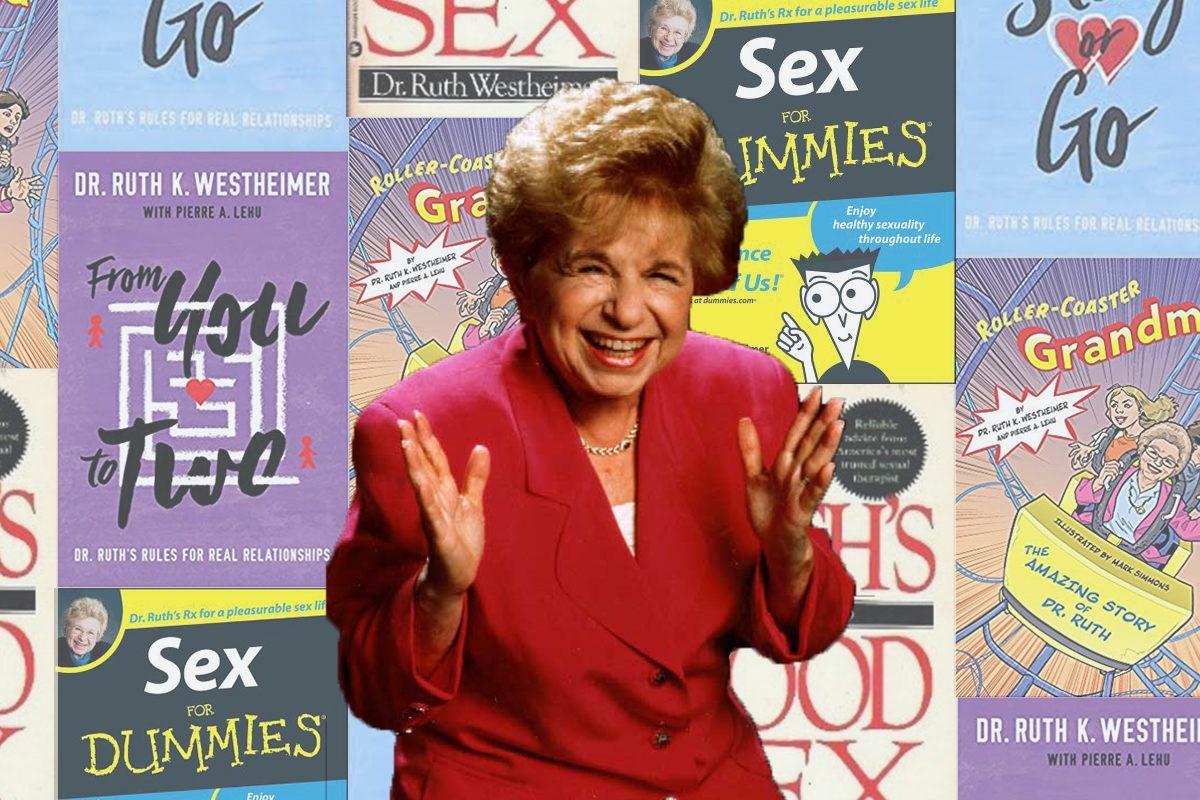In the last two decades of the twentieth century, there were many reasons not to celebrate sex. The fear of AIDS brought to the surface the connection between passion and death that has always been a dark strain in the human mind. A fundamentalist Christian reaction against the sexual revolution threatened to re-enthrone Puritan values. On the other side of the coin, millions of children were bearing children, many of them damaged by drug and alcohol abuse.
Against this desolate background, a cheerful Jewish grandmother who called herself Dr. Ruth marched forward and said, with undeniable sincerity and forthright common sense, that sex was good, indeed “heavenly.” To the astonishment of many Americans, who tend to associate religion with sexual repression, Ruth Westheimer declared that her message of liberation had its origin in Orthodox Judaism.
Early Life, Family, and Education
Karola Ruth Siegel was born in Germany on June 4, 1928, the daughter of Irma Hanauer, a housekeeper, and Julius Siegel, a notions wholesaler and son of the family in which Irma worked. Julius Siegel gave his daughter an early grounding in Judaism, taking her regularly to the synagogue in Frankfurt, where they lived. When Karola was ten years old, shortly after the infamous Kristallnacht, her father was taken to a detention camp. Her mother and grandmother then sent the little girl to Switzerland, where she lived in an orphanage for six years.
After the war, unable to find any other members of her family, sixteen-year-old Karola went to Palestine. There, she lived on a number of kibbutzim and joined the Haganah, the underground army. Later, she taught kindergarten, before going with her first husband to Paris, where she studied at the Institute of Psychology at the Sorbonne. After a divorce, she came to the United States.

Help us keep Jewish knowledge accessible to millions of people around the world.
Your donation to My Jewish Learning fuels endless journeys of Jewish discovery. With your help, My Jewish Learning can continue to provide nonstop opportunities for learning, connection and growth.
In New York, she entered the New School for Social Research on a scholarship for victims of the Holocaust. While studying, she married her second husband and gave birth to her first child, Miriam. After a second divorce, she met Manfred Westheimer. They were married in December of 1961, and their son Joel was born in 1964. The next year, Ruth Westheimer became an American citizen and, in 1970, received her Ed.D. from Columbia University.
Becoming a Sex Therapist
After working in a number of positions involving sex education, family planning, and sex therapy, Westheimer found her niche when she did a guest appearance on a local radio show. The audience response was so positive that she was soon hosting her own show, Sexually Speaking. Beginning in 1980 as a fifteen-minute embellishment to the station’s schedule, it quickly expanded to an hour and finally to two hours.
Westheimer proved to have a real genius for communicating joy in human sexuality while at the same time informing her audiences about responsibility, sexually transmitted diseases, and safe sex. The diminutive woman with her appealing accent was equally successful on television. She hosted her own program—variously called Good Sex! with Dr. Ruth Westheimer, The Dr. Ruth Show, and Ask Dr. Ruth—but her national reputation came from appearances on such network programs as Nightline, CBS Evening News, the Tonight Show, and Late Night with David Letterman.
In 1983, Westheimer published her first book, Dr. Ruth’s Guide to Good Sex. Two years later, she coauthored Heavenly Sex: Sexuality in the Jewish Tradition, with Jonathan Mark. Drawing on traditional Judaic sources, it grounds the famous sex therapist’s philosophy in Orthodox Jewish teaching. While some have suggested that the authors ignored the darker side of the classical Jewish dialectic on the subject, it is difficult to ignore the cultural significance of both the book and Dr. Ruth.
As David Biale asked:
“What does it mean for America’s best-known sex therapist to make Judaism the basis of a contemporary sex ethic? If Freud had claimed to have created the science of sexuality by destroying the ‘illusion’ of religion, Dr. Ruth reverses the course: It is precisely on the basis of religion—Judaism—that a truly healthy contemporary science of sexuality might be constructed.”
In 1991 Westheimer donned the title of “executive producer” for a documentary on Ethiopian Jews entitled Surviving Salvation. Her second PBS documentary, entitled No Missing Link, described how grandparents transmitted values, particularly religious values, during the seventy years of communism in Russia.
Dr. Ruth’s Ascent to Expert
In 1994 Westheimer entered cyberspace with Dr. Ruth’s Encyclopedia of Sex on CD-ROM. Two hundred and fifty entries deal straightforwardly with all areas of sex and sexuality. Westheimer followed it up with Sex for Dummies, in the famous series of how-to manuals. She told USA Today that her first reaction to the idea of the book was negative. “When they approached me, I said, ‘Absolutely no, I do not talk to dummies. I talk to intelligent people.’” She changed her mind, however, when she recognized the irony of the titles and their disarming appeal to a wide segment of the population. “And then I said, hold it, if I can prevent one unintended pregnancy, one person from getting AIDS, one person from getting a sexually transmitted disease, it will be worth it.”
This determinedly optimistic, affirmative, and wholesome approach leaves Westheimer open to criticism and satire. It is a testament to the endurance of the human spirit that someone who was exposed to the horrors of humanity and experienced great sorrow at an early age is able to look away from the darkness and toward the light. As she told a Reuters interviewer at the 1995 Frankfurt Book Fair:
“I was kicked out in 1939 by being placed on a train right here in Frankfurt…. I never saw my parents again. Every time I am sad I just have to think about my five-year-old grandson. Hitler didn’t want me to have that grandson. I put the picture of my grandson in my mind and say—You see, we did triumph. So I do therapy on myself.”
In May of 2000 Westheimer received an honorary doctorate from Hebrew Union College-Institute of Religion for her work in human sexuality and her commitment to the Jewish people, Israel and religion. In 2001 she received the Ellis Island Medal of Honor and the Leo Baeck Medal, and in 2004, she received the degree of Doctor of Letters, honoris causa, from Trinity College.
Westheimer has written more than forty books. In the twenty-first century, she has published about a book a year—often with co-author Pierre Lehu—including Dr. Ruth’s Guide for the Alzheimer’s Caregiver in 2012 and, in 2017, Rollercoaster Grandma!: The True Story of Dr. Ruth. A documentary about her life and work, Ask Dr. Ruth, was produced by Hulu in 2019.
Westheimer is an Associate Fellow of Calhoun College at Yale University. She also holds fellowship positions at Princeton and the New York Academy of Medicine. She is active on the board of the Museum of Jewish Heritage.
Reprinted from the Shalvi/Hyman Encyclopedia of JewishWomen with permission of the author and the JewishWomen’s Archive.



